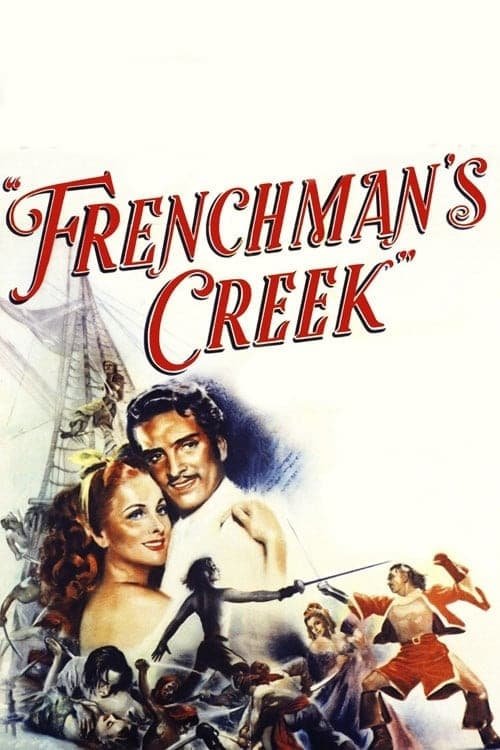Film Review: Frenchman's Creek (1944)

Joan Fontaine owes a significant portion of her stardom to Daphne du Maurier, the author of the celebrated novel Rebecca. The 1938 publication was a resounding success, and its 1940 Hollywood film adaptation, directed by Alfred Hitchcock, garnered the esteemed director his first Academy Award. Fontaine's captivating performance in the Hitchcock classic cemented her status as a Hollywood icon. In 1944, the actress starred in another adaptation of a du Maurier novel, the romantic period adventure film Frenchman's Creek. However, the results fell far short of the brilliance achieved in Rebecca.
The plots begins in 1668 London. Fontaine stars as the protagonist, Dona St. Colomb, a beautiful noblewoman trapped in a loveless marriage to Harry St. Columb (played by Ralph Forbes), a shallow man who either doesn't know or doesn't care that his wife is the object of lustful intentions by his lecherous best friend, Lord Rockingham (played by Basil Rathbone). Tired of having to reject his advances, Dona picks up her children and departs to a remote family estate on the Cornish coast. The estate, which was supposed to be rundown and abandoned, turns out to be a temporary base for Jean Benoit Aubrey (played by Arturo de Córdova), a French pirate captain whose ship, hidden in one of the tidal inlets, has been plundering the local villages. When Dona stumbles upon him, she discovers that the Frenchman is a handsome and cultured gentleman. She immediately falls in love with him and, in a daring move, dresses as a boy to join his crew and take part in one of his raids. However, their romance and adventure are soon to end as her husband and Rockingham join local nobles in their efforts to catch the pirate and his local helpers.
Frenchman's Creek, produced by Paramount Pictures, was a lavish production with a budget of 3.6 million US dollars, making it the most expensive film in the history of the studio by that time. This extravagance is evident on-screen, with elaborate costumes, props, and sets that provide an adequate reconstruction of 17th-century England. The film's use of Technicolor is particularly striking, especially in scenes featuring Fontaine, whose red hair dominates the frame.
Unfortunately, cinematographer George Barnes, who did an excellent job with black-and-white Rebecca, is not as successful with colour, and this is most evident in night action scenes that look unattractive, confusing, or simply not fitting the thrilling swashbuckling spectacle that Frenchman's Creek was meant to be.
The script by Talbot Jennings is considered quite faithful to du Maurier's novel, offering a strange combination of light material – adventure, romance, and humor – with some potentially dark scenes that involve killings, attempted rape, and the effect Dona's actions might have on her children. Modern audiences might notice potentially subversive proto-feminist overtones in the heroine, as well as some Freudian slips, such as Dona steering the ship by stroking a phallic-like steering ram. However, at the end of the day, Frenchman's Creek is still a product of its time and bound by the strict limitations of the MPAA Production Code, which mandated that the ending be in line with traditional morality and family values, making the finale rather predictable.
Fontaine plays her role very well, and in some ways, it is more demanding than her role in Rebecca, as the character of Dona is torn between her adventurous spirit and affection towards her children. However, Fontaine did not enjoy her experience on the set, which was marked by constant clashes with other members of the cast, particularly director Mitchell Leisen, whom she considered a bad choice for the project.
Some of Fontaine's complaints seem justified, as Leisen was never considered among the top-tier directors of Classic Hollywood, and he mishandles some of the scenes in Frenchman's Creek. Additionally, he struggles with pacing, especially near the finale, which seems slightly overlong. On the other hand, Fontaine had somewhat better luck with her onscreen partner, the grand Mexican star Arturo da Cordova, with whom she had adequate chemistry.
Frenchman's Creek is a solid film, but utterly disappointing after inevitable comparisons with Rebecca. In 1998, du Maurier's novel was adapted again as a television film, starring Tara Fitzgerald.
RATING: 5/10 (++)
Blog in Croatian https://draxblog.com
Blog in English https://draxreview.wordpress.com/
InLeo blog https://inleo.io/@drax.leo
Hiveonboard: https://hiveonboard.com?ref=drax
Rising Star game: https://www.risingstargame.com?referrer=drax
1Inch: https://1inch.exchange/#/r/0x83823d8CCB74F828148258BB4457642124b1328e
BTC donations: 1EWxiMiP6iiG9rger3NuUSd6HByaxQWafG
ETH donations: 0xB305F144323b99e6f8b1d66f5D7DE78B498C32A7
BCH donations: qpvxw0jax79lhmvlgcldkzpqanf03r9cjv8y6gtmk9
Posted Using InLeo Alpha
👏 Keep Up the good work on Hive ♦️ 👏
❤️ @jasonmunapasee suggested sagarkothari88 to upvote your post ❤️
🙏 Don't forget to Support Back 🙏
Keep up the good work. 👏
Recognized by Mystic artist Gudasol
You are loved.
Interested to to help music map cXc.world spread more good vibes on Hive?.